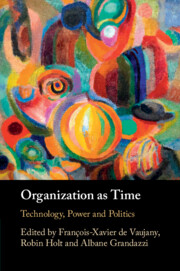Book contents
- Organization as Time
- Organization as Time
- Copyright page
- Contents
- Figures
- Tables
- Contributors
- Organization as Time
- Part I The Politics of Time: Ontologies and Metaphysics of Organization as Time
- Part II Re-orienting Critique in Organization Studies? Exploring Jointly Time and Politics
- 5 Supersessionism and the Politics of Time
- 6 Between Abandon and Inquiry
- 7 Future Work
- 8 Towards a Crinicultural Activism in Organization
- Part III New Ways of Organizing Work, Digitality and the Politics of Time
- Part IV History and Duration: Making Things Last, Enduring Politics and Organizing
- Index
- References
6 - Between Abandon and Inquiry
On the Way to Emancipatory Temporalities in Organizing
from Part II - Re-orienting Critique in Organization Studies? Exploring Jointly Time and Politics
Published online by Cambridge University Press: 22 June 2023
- Organization as Time
- Organization as Time
- Copyright page
- Contents
- Figures
- Tables
- Contributors
- Organization as Time
- Part I The Politics of Time: Ontologies and Metaphysics of Organization as Time
- Part II Re-orienting Critique in Organization Studies? Exploring Jointly Time and Politics
- 5 Supersessionism and the Politics of Time
- 6 Between Abandon and Inquiry
- 7 Future Work
- 8 Towards a Crinicultural Activism in Organization
- Part III New Ways of Organizing Work, Digitality and the Politics of Time
- Part IV History and Duration: Making Things Last, Enduring Politics and Organizing
- Index
- References
Summary
The bulk of management and organization studies draw on cybernetics and control-oriented views of time. Management is expected to follow a goal-oriented temporality, and activities keep correcting or adjusting both goals and patterns of organizing. In this chapter, the authors defend a more paradoxical view of temporality. By means of a detour towards the works of Guy Debord and John Dewey, both dérive and flânerie on the one hand, and inquiry and determination on the other hand, are jointly conceptualized as key organizing processes. From that perspective, collective activity and its politics appear as the productive differences in-between an infinitude of events oriented either towards activity or passivity, horizontality or verticality.
- Type
- Chapter
- Information
- Organization as TimeTechnology, Power and Politics, pp. 116 - 135Publisher: Cambridge University PressPrint publication year: 2023

